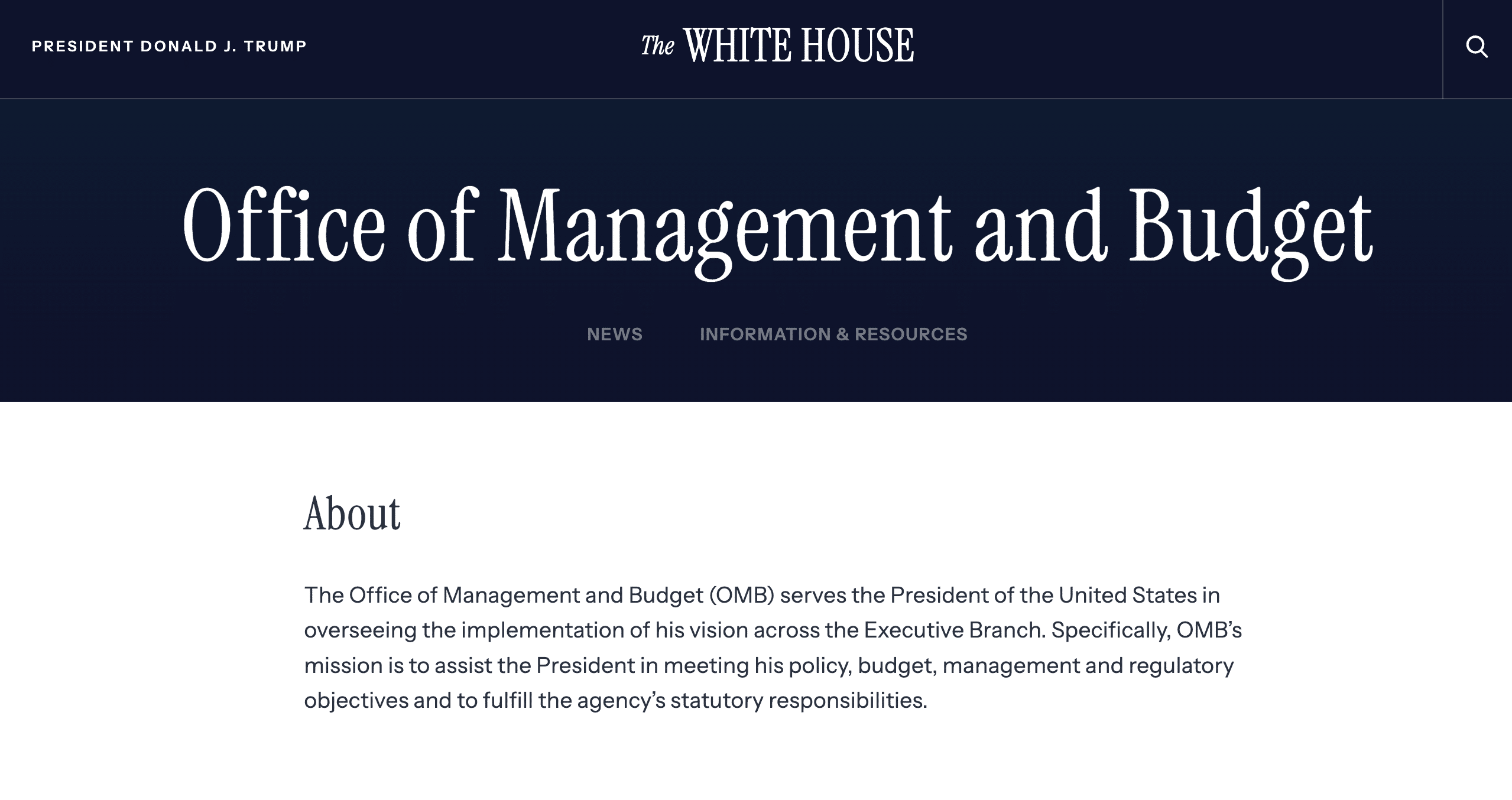First Amendment freedoms of speech and press would be severely diminished if the government could conceal vital information about its functioning. This was a primary impetus behind the Freedom of Information Act of 1966, which provided public access to many governmental documents.
In 2022 and 2023, Congress adopted similar legislation in its Consolidated Appropriations Acts, which required the Office of Management and Budget to maintain a public website in which it posted its apportionment of federal appropriations along with any necessary explanations. This was designed in part to promote separation of powers by preventing executive impoundment (failure to spend) of congressionally appropriated funds.
Office of Management and Budget closed down website
After it faced multiple lawsuits claiming that it was unlawfully impounding congressional appropriations, the Office of Management and Budget disabled and closed down the website. After Citizens for Responsibility and Ethics in Washington and the Protect Democracy Project sued the office to restore the site, a U.S. district court ruled in their favor and entered a permanent injunction preventing the office from removing the database or refusing to update it. This injunction was initially stayed by the U.S. Court of Appeals for the District of Columbia.
On Aug. 9, 2025, the D.C. District appellate court lifted this stay while the government was appealing the district court action. The appellate court found that the order to restore the website was likely to succeed on its merits, that staying the appeal could result in irreparable injury both the appellees and other parties, and that requiring the Office of Management and Budget to publish appropriation allocations was in the public interest. The court’s unanimous opinion was authored by Karen LeCraft Henderson, who had been appointed by President George H.W. Bush.
Informational injury and informational standing
A central issue in the case involved whether the parties that had challenged the federal agency had legal standing. In deciding that they did, the appellate court relied on the doctrine of “informational injury,” which it traced to Supreme Court decisions in Public Citizen v. DOJ (1989), FDA v. Alliance for Hippocratic Medicine (2024), and other lower court decisions.
Recognizing that there were limits on the information the government needed to provide, the court focused on the fact that the information at issue was required by statute and that there would be “downstream consequences” if it were not disclosed.
Congressional appropriations powers, constitutional design, and separation of powers
The appellate court noted that the Consolidated Appropriations Acts had clearly mandated disclosure of appropriations apportionment data. It also observed that the Protect Democracy Project had invested substantial resources into a website that relied on the office's disclosures and thus would suffer actual “pocketbook harm.”
The decision relied heavily upon the design of the U.S. Constitution and its allocation of powers. It reviewed the contest over appropriations in Great Britain between the Parliament and the monarch and the American adoption of the principle that the power of appropriation was lodged within Congress. The court noted that “when it comes to appropriations, congressional power is at its zenith.” It observed that the Appropriations Clause in Article I, Section 9, Clause 7 required that “[n]o money . . . be drawn from the Treasury, but in Consequence of Appropriations made by law” and that the Take Care Clause in Article II, Section 3, vested the president with a ministerial duty to see that laws are property executed.
The court rejected the idea that requiring the posting of information intruded into executive powers, noting that disclosure of such information “is not only a permissible exercise of legislative authority; at the Founding, it was considered to be a necessary exercise of that authority.” The court cited debates at the Constitutional Convention of 1787 that resulted in the Statement and Account Clause, in Article I, Section 9, Clause 7, which requires that “a regular Statement and Account of the Receipts and Expenditures of all public Money shall be published from time to time.” Surveying convention actions and debates involving key players like James Madison and George Mason, subsequent debate between Federalist supporters and Anti-Federalist opponents of congressional ratification, actions in the early republic, and early constitutional commentary by Joseph Story and others, the court pointed to “the centrality of public disclosure regarding appropriations,” Congress’s broad discretion “to regulate those disclosures,” and “the danger of Executive overreach absent public scrutiny.”
Recognizing that there may be occasions involving “predecisional” and “deliberative” discussions where disclosure would be unwarranted, the court did not find that they were at issue in this case. If the executive branch found disclosure requirements to be too burdensome, it “must seek relief from the Congress, not from the unelected judiciary,” whose “duty is to enforce the law.”
The court concluded that “no Congress should be made to wait while the Executive intrudes on its plenary power over appropriations and disclosure thereof,” and that “The public interest is best served by maintaining the separation-of-powers balance struck by the Constitution and especially so if the challenged statutes keep the citizenry abreast regarding duly appropriated expenditures.”
First Amendment implications
Although this decision largely rests of separation of powers concerns, its focus on the congressional power to mandate executive disclosure of how it is handling appropriations, is likely to strengthen not only executive accountability, but also First Amendment freedoms of speech and press. The case has further implications for the constitutionality of the Trump Administration’s attempts to cut off funding and even to close down governmental agencies prior to receiving congressional authorization to do so.
The court’s use of the idea of informational injury and informational standing could also open the door to future requests for governmental information that would facilitate the exercise of First Amendment rights.
John R. Vile is a political science professor and dean of the Honors College at Middle Tennessee State University.

